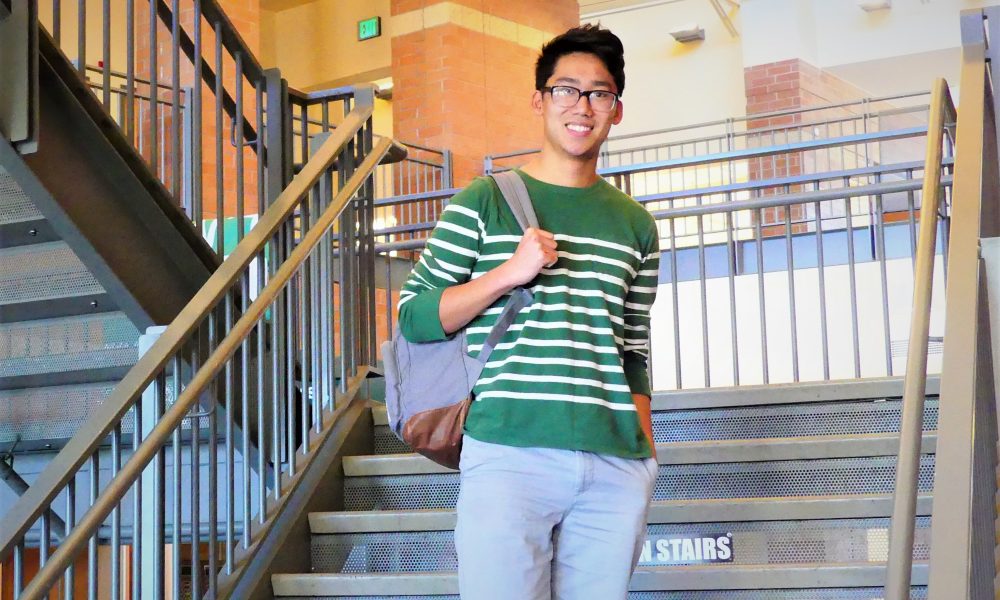
Justin Thach, a 17-year-old at West Salem High School, is one of 15 students selected as questioners in the first of three gubernatorial debates (Aubrey Wieber/Salem Reporter)
In the first gubernatorial debate Tuesday, the three candidates seeking the state’s highest office won’t be grilled by reporters or field questions from citizens in a town-hall format. In fact, most of the questioners can’t cast a ballot in November.
The debate, put on in partnership by Children First for Oregon, KOIN 6, and the Pamplin Media Group, will be controlled by 15 children and young adults, only two of whom were 18 or older when selected. The youngest, Genesis Gomez of Portland, is 12. The hourlong debate will start at 7 p.m. at Roosevelt High School in Portland, and will be broadcast by KOIN.
The students will question Gov. Kate Brown, a Democrat, Republican Knute Buehler and Patrick Starnes, representing the Independent Party.
The questioners are among the brightest and most ambitious teens Oregon has to offer.
“So much is at stake for youth in our upcoming election,” Tonia Hunt, Children First for Oregon’s executive director, said in a news release. “We are proud to be part of this historic event that will bring a sharp focus on the lived experiences of young people and what matters to them the most.”
Hunt said organizers sought participants between the ages of 10 and 20, and from a diverse backgrounds and locations, and 125 applied online. Forty candidates took the next step of submitting a video, and 20 were selected for an interview to make sure they were comfortable being on camera. KOIN and Pamplin staff then selected 16 and worked with the selected students to fine-tune the questions. One had to drop out due to a conflict.
Hunt said organizers said the prime factor in the selections were hearing compelling questions from the youth.
“They are the experts about what it’s like to grow up in Oregon, and we need to listen to them,” she said.
Justin Thach, a student at West Salem High School and the only questioner from the Salem area, is working toward a career in U.S. Congress. Along the way he plans to become a lawyer, craft education policy or do nonprofit work. Asked what colleges he’s considering, Thach said the “usual”: Harvard, Yale, Dartmouth, among other elite East Coast institutions.
For Thach, this is far from his first experience with politics. A precocious 17-year-old, he is the founder and executive director of Young Asian Leaders of America, which is focused on getting Asian-American youth more involved in their communities. He’s worked with other students to write legislative bills and is a member of Oregon Student Voice.
His experience running successfully for student council president in the eighth grade taught him why so much of what politicians preach on the campaign trail is rhetoric.
“What I realized after that is these kind of radical ideas that we want to enact are not always feasible or easy to get everyone on board with,” Thach said. “Just because of the simple fact that – who’s going to pay for it? When are you going to do it? How are you going to get people involved? There are all these factors that are easy to ignore. It’s easy to paint this as a really easy route to change.”
Thach said he sees some of that in Oregon’s race for governor, which he said has been big on promise and short on detail. That’s particular true with Buehler, who Thach said has billed himself as a fixer of Oregon’s problems while portraying Brown as a status quo candidate.
“I am a little bit cynical about the way that Knute Buehler has inserted himself as a change-maker, as someone who is going to radically change things, and I am cynical about the way he plans to do those things,” Thach said.
But Thach also said no candidate can achieve all of their campaign promises, which is fine. What’s more important, he said, is their ability to frame the conversation around key issues.
“There is also the influence they have from the words that they use to describe these things,” Thach said. “And we’ve seen that on a national level, right? The way that (President Donald) Trump has talked about immigration has obviously framed the debate on how we deal with immigrants in our country.”
Thach will not be old enough to vote in the governor’s race, but that hasn’t stopped him from scrutinizing where the candidates fall on issues he feels are most important, such as education and homelessness. He said he is leaning in favor of Brown, but thinks Buehler could sway him Tuesday night.
On Thursday, he was still deciding what questions to ask, but said regardless of the questions he will be paying attention to the answers. Too often in politics, Thach said, candidates give an ambiguous, three-sentence soliloquy when a simple “yes” or “no” will do.
“I do very much value a straightforward answer,” he said.
Here are the students participating in the debate:
Jeremy Clark, 14; Shimon Dasgupta, 16; Genesis Gomez, 12; Tosha Kitungano, 17; Rose Lawrence, 15; Deja Presseur, 16; Ja Neciya Ross, 15; Adi Solomon, 15; all of Portland; Sal Najjar, 16, Tigard; Justin Thach, 17, Salem; McKeely Miller, 17, John Day; Kai Schrosk, 15, Colton; Dazon Sigo, 17, Pendleton; Olivia Cooper, 17, Prineville; Viktoria Rosqvist, 19, Forest Grove.
Reporter Aubrey Wieber: [email protected] or 503-375-1251. He is a reporter for Salem Reporter working with the Oregon Capital Bureau, a collaboration of the Pamplin Media Group, EO Media Group, and Salem Reporter.









